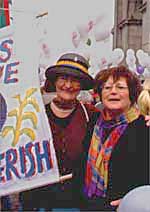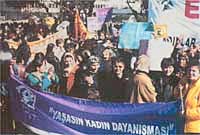In Western and Eastern Europe, the World March of Women revived or generated new feminist action. The gains women have won during the past three decades are increasingly under threat. More than ever, vigilance is called for and the struggle must be renewed.
Greek women appreciate that the March elicited "a strong current of spirited resistance throughout the planet."
"The March allowed us to train ourselves and learn to take action. It demonstrated the power of collective action and a growing solidarity," said Russian women from Perm, who presented the government with a report about violence against women in their region. Russian women explained the scanty participation in their country by the lack of a protest tradition and division within the women's movement. Romanians also mentioned the difficulty of building unity among women.

In 2000, European women organized local and national marches in many countries (Spain, France, Italy, Portugal, and Switzerland). There was tremendous participation on October 14: 35,000 women arrived in Brussels for the European march, some crossing the border on foot.
In 2001, they continued meeting together, expressing particular concern about mounting violence in the Palestinian territories. Once again, they demanded the right to abortion and contraception, fought for immigrant women's rights, against sex trafficking and in defence of social rights.






